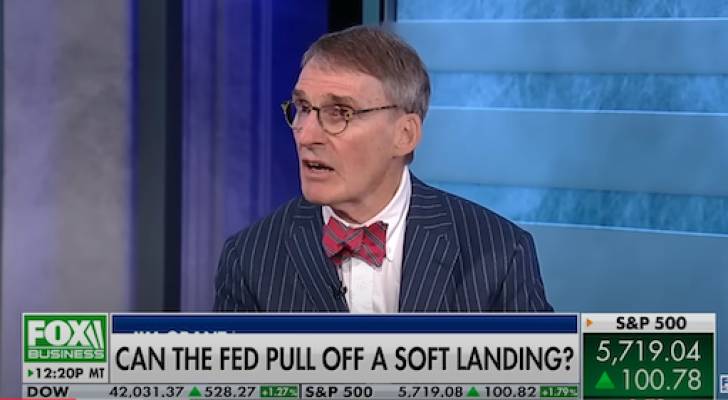Momentum in the U.S. stock market appears relentless. After a remarkable 24% surge in the S&P 500 in 2023, the index has climbed another 20% in 2024, despite some temporary setbacks earlier in the year.
Amid this bullish backdrop, Jim Grant, editor of “Grant’s Interest Rate Observer,” issued a pointed caution for investors.
Don’t miss
-
Car insurance premiums in America are through the roof — and only getting worse. But 5 minutes could have you paying as little as $29/month
-
Commercial real estate has beaten the stock market for 25 years — but only the super rich could buy in. Here’s how even ordinary investors can become the landlord of Walmart, Whole Foods or Kroger
-
These 5 magic money moves will boost you up America’s net worth ladder in 2024 — and you can complete each step within minutes. Here’s how
“We shouldn’t forget that it is at an all time [high], almost everything, price [to] earnings, price [to] book, price [to] sales, what have you, and nor should we forget that the greatest equity investor is about ready to show a balance sheet that’s 50-50, with more T-bills than stocks,” he said in an interview with Fox Business.
Grant was alluding to investing legend Warren Buffett, implying that Buffett’s pivot toward safer assets like Treasury bills — short-term debt securities issued by the U.S. Treasury with maturities of one year or less — may be a red flag for investors.
“When the greatest equity investor owns more bills than equities, one at least is advised to step back and say, if this is perfection, how does it improve?” Grant warned, suggesting that investors consider the potential risks of an overheated market.
Buffett’s cash reserve
Buffett’s company Berkshire Hathaway has reduced its stakes in several major holdings this year.
For instance, in Q2, Berkshire sold 389 million shares of its top holding Apple (NASDAQ:AAPL), cutting its position by 49.3%. It also reduced its stake in Capital One (NYSE:COF) by 21.3%, offloading 2.65 million shares. Additionally, a more recent filing reveals that Berkshire trimmed its stake in Bank of America (NYSE:BAC) down to 10.5% in Q3.
While Berkshire did make some purchases in Q2, it sold far more than it bought, marking the seventh consecutive quarter as a net seller of stocks.
As a result, the company is sitting on a substantial cash reserve. As of June 30, 2024, Berkshire’s cash, cash equivalents and short-term investments in U.S. Treasury bills totaled $271.5 billion.
What’s particularly noteworthy is the vast amount Berkshire has allocated to Treasury bills. By the end of June, Berkshire held a whopping $234.618 billion in Treasury bills.
That’s more than the U.S. Federal Reserve’s Treasury bill holdings, which stood at $195.293 billion as of September 25.
Still, Buffett held a larger position in stocks. As of the end of June, Berkshire’s investments in equity securities totaled $284.871 billion, reflecting its continued substantial exposure to the stock market.
Read more: Rich, young Americans are ditching the stormy stock market — here are the alternative assets they’re banking on instead
Why is Buffett holding so much cash?
Berkshire’s massive cash position has sparked questions about why Buffett isn’t seizing more investment opportunities. After all, as Grant noted, Buffett is often hailed as the world’s greatest investor. From 1964 to 2023, Berkshire achieved an extraordinary overall gain of 4,384,748%, far outpacing the S&P 500’s return of 31,223% over the same period.
Buffett has addressed the cash concern, explaining his cautious approach during Berkshire’s annual shareholders meeting earlier this year.
“I don’t think anybody sitting at this table has any idea of how to use it effectively, and therefore we don’t use it,” he stated, emphasizing that “we only swing at pitches we like.”
Buffett has also voiced concerns about future complexities, noting, “As the world gets more sophisticated, complicated and intertwined, more can go wrong.” He added that the company aims to be prepared to “act when that happens.”
While some see Berkshire’s cash hoard as a defensive stance against a potential market downturn, others interpret it differently. Fund manager Chris Bloomstran told Business Insider that the situation is more nuanced.
He noted that Berkshire’s large insurance operations necessitate a substantial cash reserve to cover potential payouts. Moreover, given Berkshire’s size, its range of suitable investments is limited. Bloomstran pointed out that with Treasury bills offering decent yields, Buffett can afford to be patient.
“He’s limited to maybe the 100 biggest companies in the S&P 500 and maybe a handful of international businesses to be able to invest in,” Bloomstran explained. “So, his opportunity set is expensive, but he doesn’t mind earning 5.3% in the interim, but it does not mean in any way, shape, or form that a stock market crash is imminent. He’s just trying to find great prices stable enough to put money to work. His universe is limited.”
Of course, financial prudence has always been a cornerstone of Buffett’s philosophy. In his recent letter to shareholders, Buffett emphasized that Berkshire “holds a cash and U.S. Treasury bill position far in excess of what conventional wisdom deems necessary.”
This conservative approach could prove to be a significant advantage during times of financial turmoil. Buffett highlighted that during the 2008 financial crisis, Berkshire generated cash through its operations, without relying on commercial paper, bank lines or debt markets in any capacity.
“We did not predict the time of an economic paralysis, but we were always prepared for one,” Buffett said, underscoring the importance of maintaining liquidity in uncertain times.
What to read next
This article provides information only and should not be construed as advice. It is provided without warranty of any kind.
Read the full article here

